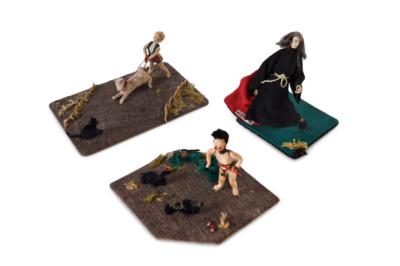Toys

Sisters Srbijanka (Joka) and Jovanka Bukumirović made for their children these three dolls - a boy with a puppy, Baba Jaga and an African warrior with an arrow - while they were imprisoned in the Banjica concentration camp (established in the Territory of the German Military Commander in Serbia in the summer of 1941). I thought for quite a long time about what to write about these toys. The problem appears even greater because the Museum of Yugoslavia, the institution that keeps these and a number of similar objects, does not have any information about the fate of their makers. It seems to me that my historian’s appetite for analyzing and explaining things, events, developments has no power here. However, Mitra Mitrović, who managed to escape from this camp, recorded bits and pieces about life within its walls. Capable to describe the lived experience of war with great care and tenderness, she noted the crucial in just a few sentences:
“It may be strange to someone what for the People’s Liberation Struggle mean these small things like: a doll, a cigarette box, [a box] for children’s pens, a cherry, a button, a sailboat, a piece of black velvet with a flower on it. On the eve of death itself, between the cold walls of the Banjica camp, joy was sought after for oneself and others. A miracle of beauty of the joy of life was made from a piece of silk. On a piece of silk and velvet, [...] I once again read the sad truth about my girlfriends, about gentle mothers who embroider their son’s pencil case, about girls who weave their dreams and youthful ardor into a slender female silhouette on the corner of men’s cigarette case or embroider a fine folk pattern on a doll’s clothes.”
Image: Reproduced with the permission of the Muzej Jugoslavije (Museum of Yugoslavia), Belgrade, Serbia. Further reproduction is prohibited.
Quote: Mitra Mitrović, Ratno putovanje [War Journey] (Belgrade: Prosveta, 1953).
